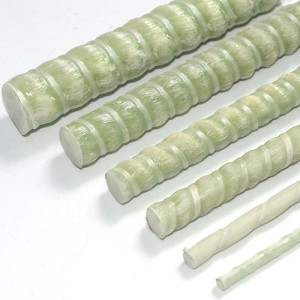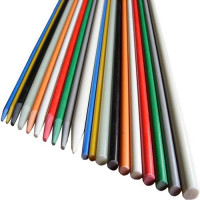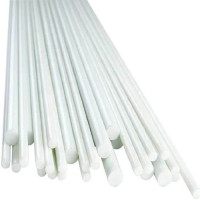Fiberglass rebar, also recognized as glass fiber reinforced polymer (GFRP) rebar, emerges as a groundbreaking substitute for traditional steel reinforcement in construction endeavors. Crafted from high-strength glass fibers ensconced in a polymer resin matrix, fiberglass rebar delivers outstanding durability, corrosion resistance, and lightweight attributes.
Crafting Excellence:
The manufacturing process of fiberglass rebar entails pultrusion, a method wherein continuous glass fibers are imbued with resin and then drawn through a heated die to fashion the desired shape. This meticulous process yields a composite material that surpasses steel in strength and weight, rendering it ideal for diverse structural applications.
Advantages:
Fiberglass rebar boasts an array of advantages, chief among them being its corrosion resistance. This attribute significantly elongates the lifespan of reinforced concrete structures, especially in challenging environments like coastal regions or chemical processing plants. Moreover, its non-conductive and non-magnetic nature renders it suitable for applications in electrical and magnetic-sensitive contexts.
Beyond corrosion resistance, fiberglass rebar offers several benefits, including ease of handling, reduced labor costs, and enhanced sustainability. Its lightweight composition facilitates hassle-free transportation and installation, while its non-metallic properties avert the risk of rust staining and concrete spalling.
Applications:
Fiberglass rebar finds broad utility across various construction ventures, encompassing bridges, highways, marine structures, buildings, and underground infrastructure. Its versatility, durability, and long-term cost-efficiency position it as the preferred choice for engineers, contractors, and project owners seeking innovative reinforcement solutions.
As the construction industry increasingly prioritizes sustainability and resilience, fiberglass rebar emerges as a compelling alternative to traditional steel reinforcement. With continual advancements in manufacturing technology and heightened awareness of its benefits, fiberglass rebar is poised to exert a significant influence on the future of global construction practices.
Distinguishing Steel from Fiberglass Rebars:
Steel and fiberglass rebars each present distinctive advantages and characteristics, warranting a comprehensive understanding for tailored applications.
- Corrosion Resistance: Unlike steel rebars necessitating protective coatings or corrosion inhibitors, fiberglass rebars inherently resist corrosion, making them ideal for projects in corrosive or durability-sensitive environments.
- Weight and Handling: While steel rebars are cumbersome and require heavy machinery for transportation and installation, fiberglass rebars are lightweight and easily manageable, culminating in time and labor savings during construction.
- Electrical and Magnetic Properties: Fiberglass rebars, with their non-conductive and non-magnetic attributes, cater to applications where electrical conductivity or magnetic interference is a concern, such as hospitals, laboratories, and electronic facilities.
In conclusion, while steel rebars remain prevalent, fiberglass rebars offer unparalleled advantages in corrosion resistance, lightweight properties, and handling ease, progressively establishing themselves as the preferred choice for contemporary construction undertakings.



